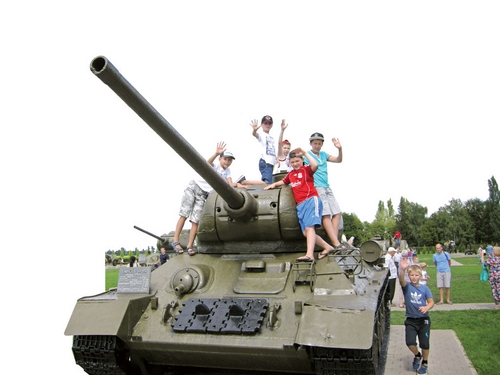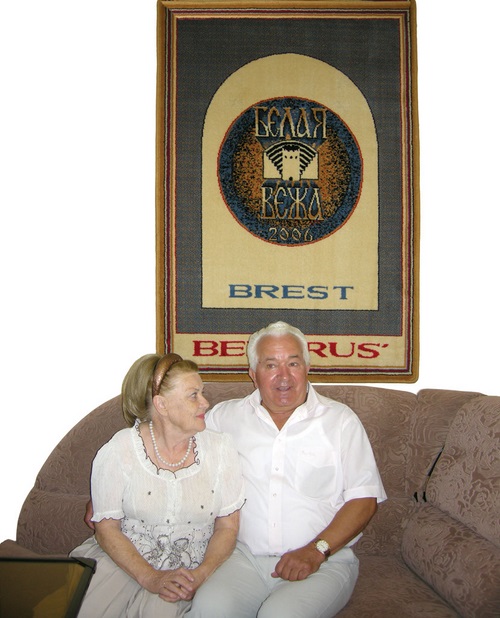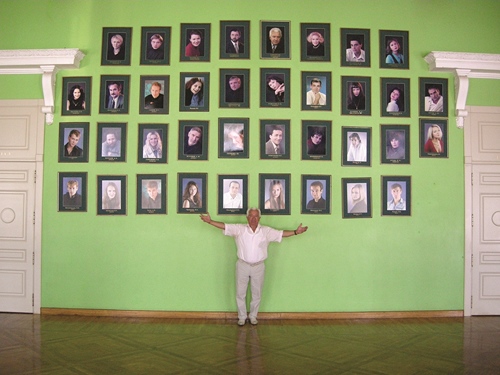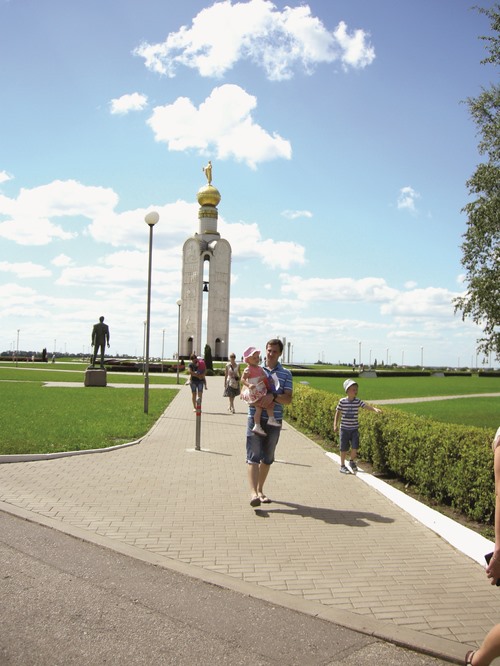
Nikolay Grashchenko, who was born in Mogilev Region’s Krichev District, is an Honoured Worker of Culture of the Russian Federation and the artistic leader of the Folk Creativity Centre
Photo: Ivan Zhdanovich
Nikolay Grashchenko, who was born in Mogilev Region’s Krichev District, is an Honoured Worker of Culture of the Russian Federation and the artistic leader of the Folk Creativity Centre. Moreover, he is an artistic producer of Victory Day festivities in Prokhorovka, in addition to writing scripts for these events. Of course, Mr. Grashchenko is pleased that district authorities trust him with such responsible events, including wreath laying, a solemn meeting, a concert, and various performances… Delegations from various countries are welcomed, including Belarusians, alongside the Great Patriotic War veterans, and artists. When the 70th anniversary of Victory was celebrated in Russia, ‘Vityaz’ pilots were present and, in 2014, the audience admired the talent of 500 wind instrument musicians. This year, the holiday in Prokhorovka was also a success.
Each August, Nikolay Grashchenko drives to his native places; not to Darlivoe village (where his family used to live) but to Cherikov, located some 600km from Belgorod, and which is home to his sister, Zinaida — a former teacher and now a pensioner. Mr. Grashchenko admits that he feels his soul relaxing when he arrives. His sister has a summer cottage, with a forest nearby, where berries and mushrooms can be gathered. The River Sozh is also not far, fed by the Udushka tributary. Mr. Grashchenko has so many wonderful stories...

My parents and my birth
My parents, Arkady Nikolaevich and Vera Platonovna, come from Krichev District, which borders Russia’s Roslavl District. Our ancestors lived along the border of Belarus and Russia. My mother comes from the village of Labkovichi, while my father is from the neighbouring village of Tikhil, which was located on Russian territory.
When the war broke out, my father, who was just 19 at that time, was mobilised. He was taken prisoner, being moved to Germany. Fortunately, a good family took him from the camps and treated him humanely. He didn’t ever speak about the war — it was a taboo subject, but my mother was very talkative. She’d often sit us, five children, on the stove and tell us about the occupation, from when she was just 18. She related having witnessed attacks and retreats, and how awful it was to see the Germans leading our captive soldiers and officers along the road for two days. She told us of her delight in the Victory and that our father had avoided impri-sonment for having being captured in Germany. Fate has its role to play. We learnt from our mother why our father was so good at caring for cattle, cleaning standing stalls and cooking. He learnt everything from his hosts in Germany. He did everything meticulously. When a pig was slaughtered, he could make smoked meats, such as sausage.
It’s normal for nations to learn something useful from each other. My father also played the white button accordion, brought from Germany. Probably, this button accordion brought him closer to my mother in 1945. She was cheerful and would sing lively couplets and dance. She also played the drum really well. As the years passed, our father played the accordion far less, becoming tired; working as a farm machinery operator on a kolkhoz wasn’t easy. He was entrusted with the first tractor, as soon as it appeared on the Kommunar kolkhoz. He was calm, sober-minded and steady, for which he was respected, and respectfully called Nikolaich.
According to my mother, I was almost born in a sleigh, during the January frosts, when her labour pains occurred around 20km from Krichev. My father harnessed the horses, wrapped my mother in overcoats and set off. It seemed that I was in a hurry, so they had to stop near a small, isolated farmstead, at the first house. An old woman, Khronya, helped my mother deliver the baby.
My parents bought their first small house close to this old woman. My brightest childhood recollections are connected with that farmstead. I remember, aged 6, exploring in the forest, close to the farmstead. I was very curious, from the earliest years. Of course, I became lost and was very frightened… My cries were heard by Uncle Artem, a patrolman with the railway, and he brought me home. I had to go to school 4km away, in Komarovka village, through snow and rain, despite the lack of roads. I also remember how, being the youngest, I was playing football barefoot, with other boys. We’d run home to help our mothers if we were called. There was no such notion as ‘I don’t want to help’. We ran home since not only work was waiting for us but our mother’s warm bread with its crisp crust. I’ll never forget the aroma of my mother’s bread…
From harmonica to button accordion
I have a good ear for music since childhood and could well repeat me-lodies and songs. Of course, I wanted to learn to play a musical instrument. My uncle Pavel, the husband of my father’s sister, presented me with a harmonica. He himself played it well and saw my talent. That harmonica didn’t ‘respond’ immediately: before starting to play it I had to deal myself with degrees which were arranged chequer-wise rather than vertically, as in an ordinary instrument. Though I was seven years old I guessed this secret myself and began to play familiar melodies.
I well remember how I was playing at parties which were organised at someone’s big house. Both young boys and girls asked my parents to let me go and someone would sit me on the shoulders and bring to the ‘club’.
I won’t forget how I was working as a shepherd in kolkhoz together with brother Volodya and how we entered the musical school in Krichev to study button accordion. If it were not for school deputy head teacher Mikhail Levit I wouldn’t probably have become a professional musician. Due to him I demonstrated persistence of the character and learnt to play the button accordion after playing harmonica. After six months of studies at musical school my teacher told me that I wouldn’t learn anything. I began to study 10 hours a day, before classes and after. By the end of the academic year I was ranked second at the regional contest of button accordion players. Now I understand how my teacher was pleased with my success. However, I didn’t finish the musical school, since I perceived the disease of my favourite teacher as a personal tragedy. Moreover, at that time I already had a secondary education certificate, so it was high time to move further.
I went to Mogilev and entered the conducting and choir department at the musical college. I studied a year and then went to the army. This was 1968. I remember this time well, as if it was yesterday: my T-62 tank, study time in Borisov and how our separate fighter unit was going to Slovakia through the whole Ukrainian territory from May to August. I also well remember how I was playing ‘Moscow Nights’ and ‘Katyusha’ for Slovaks using my button accordion. When I recollect those days I involuntarily smile: my ‘Rostov-na-Donu’ button accordion was a part of ammunition load and ‘travelled’ with me in the tank.

Galina and Vitaly Slobodchuk
Bogatyrs of the Neva River
I graduated from the musical college in Mogilev with honours, worked a little bit at a state farm and technical college but had no desire to continue further. I understood that I couldn’t walk over my parents, so I went to submit my documents to the Culture Institute’s correspondence department in Leningrad. The enrolment board proposed me full-time education, since the enrolment competition was 6 candidates per place and I had definite advantages: a musical college with honours and army service. Moreover, I was an alternate member of the CPSU [Communist Party of the Soviet Union]. I didn’t hesitate much and wrote an application to study at the conducting and choir department. This happened in the room of Prof. Ivan Poltavtsev, who headed the choir conducting chair at that time. He impressed me greatly saying that I’m a worthy candidate to enter the full-time courses. I was admired by the people I’ve seen within the walls of the institute — all were beautiful, intelligent and talented. Moreover, Leningrad with its Winter Palace, beautiful Neva River, the Palace Embankment, St. Peter and Paul Fortress, the Fontanka and other sites greatly allured me. I thought that it’s much better to live and study here for five years than to attend sessions twice a year.
I was lucky since I managed to become employed as an institute street cleaner. I used to sweep the Palace Embankment for two years where our university is still being situated. For this I was given a room in the basement of the institute which had its small housing stock.
I had to wake up at 3a.m. and took the brush… Of course, I wanted to sleep during lectures but I tried to go to sleep earlier if there were no concerts and parties. In the course of time I got used to such regime.
Being at the institute I fell in love with my would-be wife, Alla. We got married bring students of the next-to-the-last year. On the day of our marriage, November 2nd, 1975, snow was already lying in Leningrad and I well remember how Alla gathered it into her white shoes…
We’ve chosen the Belgorod cultural and educational college as our appointment place where a department of folk choir was opened. My wife, an honorary worker of the secondary professional education of the Russian Federation, still works there. We, two young graduates of the Leningrad State Culture Institute, enrolled first students of this department. I remember how we were proud of this and we were very pleased. Though it was difficult from the material point of view we didn’t lose our heart. At first, we rented a house and then were given a room at the hostel when I began to head an amateur ensemble at the sixth professional technical college. There I also became a head of the Komsomol organization and worked in the Komsomol’s regional committee, the regional committee of the party and director of the Yubileiny House of Culture. I headed the Belgorod musical college for 23 years and now returned to the Yubileiny which houses our Folk Creativity Centre,
We’ve lived with Alla 40 years and celebrated our ‘ruby’ wedding. We have two adult children: daughter Lyudmila and son Ilya — also musicians. Lyudmila is a folklorist by education and a candidate of sciences while Ilya is a flute player, an orchestra artist and a soundman of the Belgorod State Philharmonic Society. I’m proud that he is also an organ keeper. He has passed internship in Germany and now adjusts this unique instrument. The organ was made by Germans when the philharmonic new building was erected. A couple of years ago they visited us and were pleasingly surprised with the good condition of the instrument.

Vitaly Slobodchuk: “There are two Belarusians among my artists”
The Slobodchuk family
In my life I have met Belarusians many times. Several Belarusians were working at the musical college when I was its head and now two Belarusian women are working in our centre. I also make friends with Director of the Belgorod State Academic Drama Theatre (named after M.S. Shchepkin), Vitaly Slobodchuk. To be more exact, our families have been on friendly terms for thirty years already. His wife, Galina, comes from Belarus; her father, General Mikhail Khorek, was born in Baranovichi. He was fighting during the war and returned home in 1945. Galina’s mother died in 1941 and her father married for the second time and took his daughter and son Gennady from Baranovichi in 1947, thus gathering the whole family. This is a separate story. However, he died early, at 56. Galina told us that her grandfather worked at the railway station in Baranovichi and was awarded the Lenin Order.
Each year we gather after festive events in Prokhorovka, dedicated to the Victory Day. Of course, we recollect our relatives who have already passed away. My parents have also died. Meanwhile, the Slobodchuki family got acquainted through music, just like Alla and I. Galina was playing the piano while Vitaly was playing the violin. Interestingly, but he is likely to be a Belarusian too, since his father comes from Smolensk and previously this territory belonged to Belarus.
The Victory Day is a sacred holiday and is a double celebration for Vitaly Slobodchuk, who was told that he had been ‘born twice’. During fierce battles, his heavily pregnant mother hid with her six children and others in a cellar. On emerging from the cellar, a shell fragment hit her hand, which brought on the final stages of labour; Vitaly was then delivered in the cellar, upon sacks of potatoes. When Germans were retreating, his mother began travelling with her children to Belgorod, to try and save her daughters from being captured to Germany. She was placed in a horse-drawn cart, while the oldest of her daughters, aged 16, carried newborn Vitaly. However, his sister began to fear that Soviet soldiers looking at her would think that she had delivered a German child, so she hid Vitaly in crushed reeds during a river crossing via a pontoon bridge. She left him there and hurried to catch the cart but, realising that she’d have to explain everything to her mother when the time came to feed the baby, she returned. In this way, he was born twice, as his sister often reminded him: once by his mother and the next by her hand. Vitaly was born on August 14th, 1943 while Belgorod was liberated on August 5th.
Vitaly can’t hold back his tears when he tells this dramatic story, together with Alla and Galina we also cry. Meanwhile, in general, he is cheerful, joyous and amusing.
I’m proud of my friend and my friendship with his family. He once said that we can’t even quarrel with each other. This is true. Vitaly managed to make his way in life from Belgorod’s gang district of Peski where one could have been beaten because of going with a violin. He says that the violin has ‘created’ him. His parents were ordinary people and he began to play with orchestras from the second year at the musical college while also playing at weddings and funerals, and thus helped his mother…
They had many interesting moments in their life with Galina. One of them was connected with Galina’s letting her husband to study at full-time higher theatrical courses in Moscow. At that time, he was already 42 years old and had children. Of course, they had difficult but everyone has them…
Vitaly Slobodchuk is also skilful in managing the theatre and he is a right man in the right place in the position of theatre director. Best stage managers of Russia bring their performances to our theatre. Belarusian Alexey Dudarev’s ‘Common Soldiers’ play was also staged here — a good performance.
The theatre is definitely experiencing its flourish, with full houses following one after another and tickets selling like hot cakes. It also hosts ‘Actors of Russia — to Mikhail Shchepkin’ Festival. According to Vitaly, it’s important for Belgorod and the whole Russia. In July 2007, Mr. Slobodchuk was awarded the ‘Honorary Citizen of the City of Belgorod’ title for his contribution into theatrical art. This is my friend! Moreover, Mr. Slobodchuk has also brought performances to ‘Belaya Vezha’ Festival twice and they became prize winners.
I can speak much about the family of Slobodchuki, their children and grandchildren. They are good people!

Prokhorovka, 2015
Life goes on
Mr. Grashchenko also tells us about ties with his colleagues in the sphere of culture, particularly about ‘Khotmyzhskaya Autumn’ international folklore festival, held every other year in Borisov District’s Khotmyzhsk in Belgorod Region. According to Anna Kalashnikova, one of the heads of the Fold Creativity Centre (born in Begoml), last year, this event brought together over 50 creative groups of folk music, song and dance, 159 masters of decorative-and-applied art and amateur artists from Vitebsk, Mogilev, Minsk, Gomel and other regions. Meanwhile, Russia was presented by Belgorod, Voronezh, Lipetsk, Kursk, Rostov, Tambov regions, as well as Rostov-on-Don, Vladimir and Moscow.
On September 18th, when the festival was launched, an agreement was signed in Sochi at the 2nd Forum of Regions of Belarus and Russia between the authorities of Belgorod Region and the Belarusian Government on trade-economic, sci-tech and cultural cooperation for five years. It says that the sides should create the necessary organizational, financial-economic and legal conditions for the functioning of joint enterprises, developments and implementation of joint projects and programmes, which are of mutual interest. They should also provide participation of enterprises in trade fairs, exhibitions, auctions and other events which are held. This also includes exchange of delegations, specialists in various branches of trade-economic and other activities. The sides will also promote the development of collaboration in the sphere of sci-tech activity, culture and social sphere. Moreover, interaction between national-cultural societies is activated, in addition to youth and other public organizations, with regular exchange of creative groups.
We remember well our positive feelings from the trip to Belgorod Region which coincided with such an important event as the 2nd Forum of Regions of Russia and Belarus, strengthening our relations and friendship.
Friendship between our countries and nations is known to be strong by personal contacts of people. We had an opportunity to again make sure in this during our visit to Belgorod. Not only Belarusians were among our good acquaintances, but also their friends and relatives. We’ve already told on the pages of our magazine (#11-2015) about the meeting with brother Oleg Lugovskoy, former navigator pilot and a son of the battle-front veteran who has been to Belarus several times, particularly at the military aerodrome in Machulishchi, near Minsk, and his involvement in the Great Patriotic War. Nikolay Pyshnev, an Honoured Pilot of Russia and our old friend, who now lives with his family in the Dubovoe, near Belgorod, also deserves special attention. Like Mr. Grashchenko is proud of his friendship with Vitaly and Galina Slobodchuki, we’re also pleased with our enduring friendship with Nikolay and Alla Pyshnevy. Though we don’t meet very often modern technologies enable us to see each other and exchange news. We’re proud that Nikolay has raised from a flight instructor of the Volchansk aviation pilot school DOSAAF (in Kharkov Region) to the level of the international class pilot, to command assignments, while constantly improving his qualification. He was the first to lay air routes from Yakutsk to the USA, China and Bulgaria (as a commander of the aircraft). Moreover, he also flew around 13,000 hours accident-free.
At www.yakutskhistory.net one can read: Nikolay Alexeevich received access towards instructor work and prepared 20 pilots, having mastered flights at Tu-154 aircraft. He had to transport governmental delegations of Russia. After his return from Yakutsk he worked as deputy director general of Belgorod aviation enterprise JSC and often visited Minsk on business. Moreover, Nikolay Pyshnev is a wonderful story-teller! A whole book can be written about his exciting life of the pilot, his friends, among whom there were also Belarusian. Nikolay plans such a book but now he has to help children bring up his grandson Nikolay. He says that the most important is that sky was peaceful.
By Ivan and Valentina Zhdanovich











